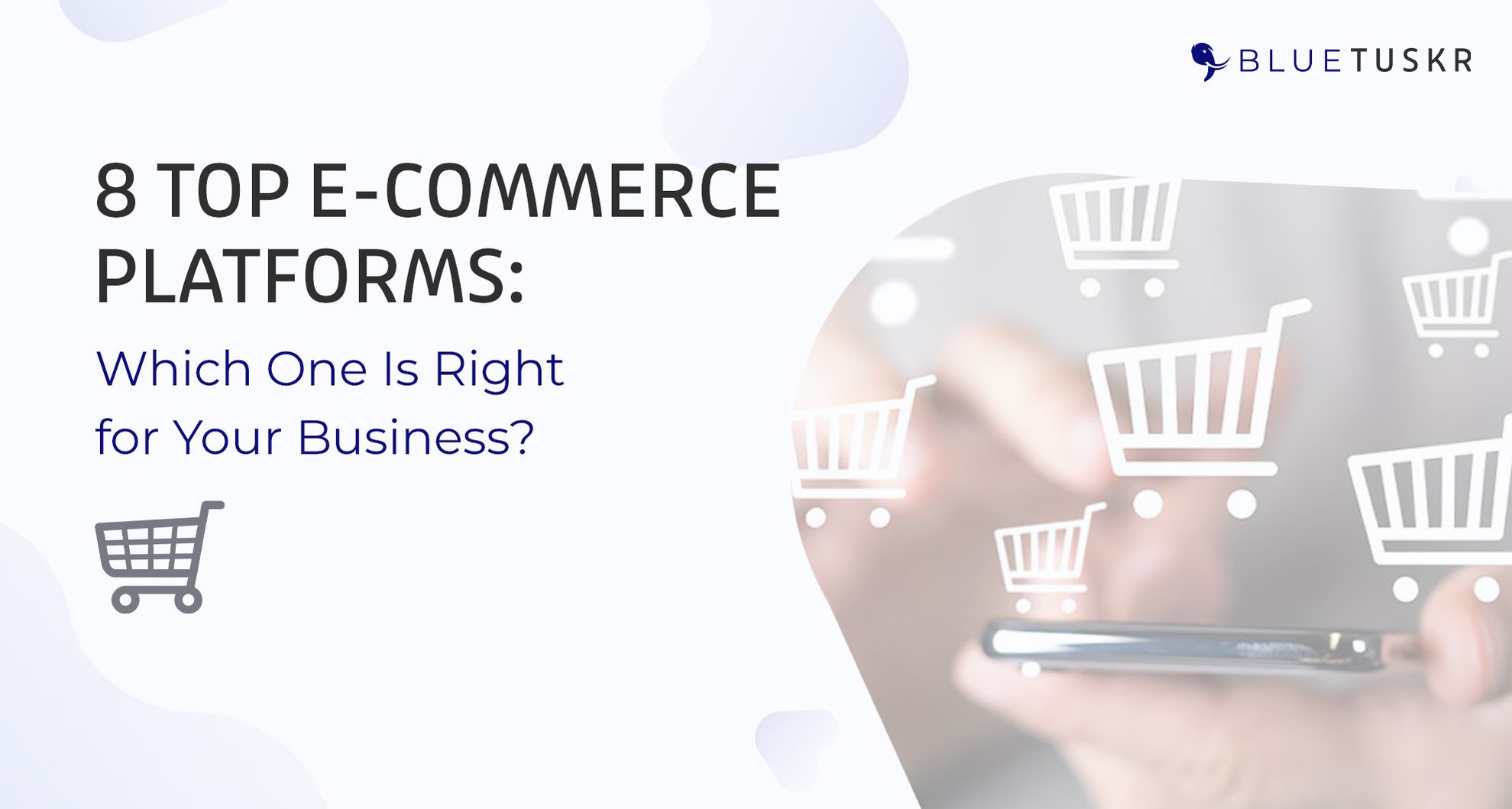
8 Top E-commerce Platforms: Which One Is Right for Your Business? - Updated 2023
If you want to have a successful e-commerce business, you need the right solutions and tools by your side. This is especially true when choosing an e-commerce platform.
Often, e-commerce platforms are the foundation of a seller’s operation. They centralize key activities, like website management, sales, and marketing. Plus, many offer inventory management capabilities or integrate with leading inventory management software solutions. Essentially, they allow you to ensure that critical aspects of your business can be managed from a single place, making your company easier to oversee.
While there are many amazing e-commerce platforms around, they aren’t created equal. Some are better for certain situations than others, so choosing the one that is best for you is a must. If you want to make sure that you select the right one for you, here’s what you need to know about e-commerce platforms, as well as what some of the best options provide.

Choosing the Right E-commerce Platforms for Your Business
Selecting the right e-commerce platform is essential for your business. Without the proper tools and capabilities, you may not be able to achieve what you envisioned. At times, this can simply be a nuisance. However, in a worst-case scenario, not having the ideal features could harm your bottom line.
If you want to choose the ideal option for you, it’s important to take a close look at your actual needs. Every e-commerce seller is different, and that means you may have e-commerce platform requirements that other sellers don’t.
For example, dropshippers need to approach the situation differently than sellers who are storing and moving their own products. These are two unique niches, so e-commerce platforms that work for one might not be the best choice for another.
Additionally, you need to consider usability. Some sellers are incredibly tech-savvy, so they won’t have an issue with e-commerce platforms that are more complex or have steeper learning curves. Others need a user-friendly approach, one that doesn’t require any technical prowess – such as coding capabilities – to make the most of what the solution has to offer.
Ultimately, the best e-commerce platform for you is the one that meets your needs. By focusing on that above all else, you’ll be able to select a winner.
8 Top E-Commerce Platforms

1. Shopify / Shopify Plus
Features
Thanks to its well-rounded features, Shopify could effortlessly pass as the best eCommerce platform. The most noticeable thing about it is its online store, but the marketing tools and other important features are also helpful. Nevertheless, the user-friendly nature might be the best feature of this eCommerce software.
Here are the features of this popular eCommerce platform:
- Online store
- A buy button to turn an existing website into an online store
- Sales channels via social media platforms, including Facebook, Instagram, YouTube, Google, etc
- Email marketing and automation
- Facebook Ads
- E-commerce automation
Shopify makes selling online easy with these features. The online store encompasses the whole essence of the eCommerce platform, but it can turn even a blog into a fast-selling online business. Other aspects require technical knowledge, like the website builder.
If you want an eCommerce platform with a user-friendly interface, this is it. You can explore other areas with some technical expertise, like app integrations, mobile commerce, etc. Shopify is a good starting point to take your sales business online.
Customer Support
Shopify looks out for its customers or online retailers through robust customer service. Support is available on the eCommerce platform 24/7. In addition, you can reach the support team via email and live chat.
The help center is also available for self-service. It is an excellent customer support tool for basic Shopify users.
Pros and Cons
Pros
- Over 6,000 app integrations.
- Social media marketing is available.
- Technical support is available 24/7.
- There is a free trial for new users.
- Search engine optimization is available.
Cons
- Customization is limited.
- Limited features on the basic plan

2. BigCommerce
Features
BigCommerce is among the most popular eCommerce platforms. It even has a free demo for new users to learn about the platform via a hands-on approach. Still, there are more features to give your online store a boost.
The abandoned cart recovery feature is ideal for your online store. Even so, the eCommerce platform works for B2C and B2B (business-to-business) businesses. Here are BigCommerce’s most essential features:
- Drag and drop editor
- Theme customization and integration to WordPress websites
- Digital wallets and SEO features
- Headless commerce to connect your WordPress blog
- Cross-channel commerce - integration with eBay, Amazon, Google shopping, and other marketplaces
- Multi-language support
- Scalable catalog
BigCommerce has many more features to give you a highly customizable eCommerce platform. You can get even more via its custom APIs if you have the technical know-how. Running eCommerce businesses online has always been challenging, but BigCommerce has the tools for it.
Blog integration allows content marketing even as you sell via your online store. Cross-channel commerce brings sales across multiple platforms.
BigCommerce offers reputable website security with PCI compliance. It doesn’t just offer tools to build an online store but also provides enough customization.

Customer Support
BigCommerce’s customer service is robust. It has telephone support for different regions, including the USA, the United Kingdom, Europe, Canada, New Zealand, Singapore, etc. You can also call the international helpline.
Besides telephone support, you can reach the sales team via live chat and email. These channels are effective in getting the message across to BigCommerce. The eCommerce platform also offers customer service through Twitter, Facebook, and LinkedIn, among other social media sites.
Pros and Cons
Pros
- The eCommerce platform supports multiple currencies (over 100).
- Its customization options are extensive
- The features are robust
- Multiple payment providers
- WordPress site integration
- Manage multiple stores in just a few clicks
- Ease of use
Cons
- There is annual sales volume on the plans you need technical expertise to harness the features

3. WooCommerce
Features
You can turn your WordPress website into an online store with WooCommerce. This eCommerce platform allows you to run your own online store or build for others. The features are enough to add shopping capabilities to any existing site.
You’ll need web design expertise to embrace the full potential of this eCommerce platform. Here are its most notable features:
- No code customization cart and checkout workflow
- Mobile-friendly templates with drag-and-drop functionality
- Built-in marketing tools
- Email marketing automation
- Shipping integrations for DHL and USPS
- Multiple extensions
- Tools to build a SaaS platform
The features may not top the charts of the best eCommerce platforms, but WooCommerce is friendly to web developers. You can create a worthy rival to a Shopify store with developer resources. Even so, the platform works if you want to start selling immediately.
WooCommerce works for smaller businesses and large ones. It has tools for online and in-person payments and revenue tracking on one dashboard. The blogging feature will also be handy if you are a content creator.
Customer Support
The WooCommerce platform provides live chat via a small pop-up window at the bottom of the screen. Give it a tap to open the chat window. Alternatively, you can use the resources to find solutions to your challenges.
Pros and Cons
Pros
- Fully customizable and flexible
- Multiple payment integrations
- Secure checkout
- Tools for discount codes
- Payment for in-person sales
- Inventory tracking
Cons
- Too complex for beginners who just want to sell products
- Memory consumption because of plugins
-
The platform is open source, but you must pay for the extensions.
4. Magento
Features
Adobe Commerce provides excellent features for professional-looking B2C and B2B eCommerce experiences. The platform allows you to tailor the experience to your customers instead of letting them experience the same thing. Furthermore, it provides tools to embed content and promotions into your eCommerce store.
The Adobe Experience Center helps support Magento, which lets your online store work with other products. They include analytics, experience management, and real-time CDP. Let’s list a few features of Adobe eCommerce before we get ahead of ourselves.
- Quick checkout
- Drag and drop builder
- Catalog management
- Order and inventory management
- Multiple payment gateways
This eCommerce platform offers a free assessment to help new users get started. Beyond that, it puts its features into several categories for easy identification and usage. You can push your eCommerce website with features under sales, management and delivery, measurement and optimization, scaling, support, payments, etc.
There is a dedicated section for the customer journey in online stores. It gives you tools, like a content management system, to keep your customers interested at every step of the sales process.
Customer Support
Magenta offers a demo for new eCommerce store owners. That will support you initially until you register with the platform. Then, you can contact customer service via the telephone line or visit the parent website for extra support.
Pros and Cons
Pros
- Inventory tracking via real-time counts
- The eCommerce platform is responsive on mobile devices.
- The extensions are free and paid.
- It is scalable for eCommerce sites.
- Multichannel selling online and offline
Cons
- Third-party hosting can be expensive to carry the load.
- You need a hosting provider
- The cost adds up quickly


5. Squarespace
Features
Although more popular as a website builder, Squarespace is also an eCommerce website builder. Its features let you launch your store and sell products online. Here are some of them:
- Inventory panel, notifications, and API
- Shipping label and local pickup
- Buy now, pay later
- Appointment scheduling
- Video conferencing and invoicing
- Tax management
- Order management
- Marketing Features
Squarespace also provides third-party integration with several services. You can add payment, shipping, sales reports, promotions texting, live chat plugins, etc.
The platform also features integration with an email marketing app like Mailchimp.
Customer Support
Squarespace has a help center that segregates its customer support into different channels. The contact page provides communication channels for partnering and sponsorships, PR and communications, HR inquiries, security escalations, and technical issues. Pick the one that concerns you and open the customer service page.
Pros and Cons
Pros
- Unlimited products
- Subscription service is available for online sellers.
- Versatile product editor
- Good for design
Cons
- The eCommerce platform supports only a few currencies.
- Language support is not robust
- Not ideal for international business needs

6. Volusion
Features
One good thing about Volusion is that you can explore its features for free. It offers a free trial for 14 days, and you don’t need your credit card. Volusion is practical but not as robust as the most popular eCommerce platforms.
Its eCommerce features include the following:
- Mobile-friendly and customizable themes
- Customizable layouts
- Category pages
- Search functionality
- HTML/CSS editor access
- Subscription-based products
While not at the top of the list, the premium themes and other features give Volusion good standing. It supports multiple payment options with an SSL certificate for your own website.
Customer Support
Volusion offers email and live chat support to personal and professional plan subscribers. Prime and business plan members get an extra boost with telephone service.
Pros and Cons
Pros
- SSL certificates are available
- Customizable features
- Free trial without credit card
- ROI tracking is available
Cons
- No blogging capabilities
- A little complicated compared to Shopify and BigCommerce
7. PrestaShop
Features
The major downside of PrestaShop is that it is not a self-hosted platform. Other than that, it offers excellent features in PrestaShop and PrestaShop Expert. Here’s a list of some:
- Website backoffice
- Marketing tools
- Product Catalog
- Shipping features
- Dropshipping
These features don’t come easy, as you’ll need technological prowess to explore them. Notwithstanding, you can always get a developer to handle the technicalities.
Customer Support
PrestaShop is available for walk-in customer service at its office in France. You can use the live chat option if that is too much for your small business.
Pros and Cons
Pros
- Ease of use for seasoned users
- Multi-language support
- Multi-currency support
Cons
- It is not a self-hosted eCommerce platform.
- No blogging feature
8. 3dcart
Features
We are down to the last eCommerce site builder on this list. 3dcart, now Shift4Shop, offers a free eCommerce solution for digital and physical products. While the platform is free, integrations come at a competitive rate.
3dCart’s key features include the following:
- HTML/CSS editing
- Customized checkout
- SEO tools
- Blogging tools
- Customer relationship management
The startup cost is relatively affordable. However, you’ll pay more as you add more integrations.
Customer Support
Shift4Shop offers an extensive customer support form on its website. It allows for direct messaging to the support team, including document uploads.
Pros and Cons
Pros
- Versatile features comparable to the best eCommerce platforms
- Product and customer reviews are available.
- No monthly fee
Cons
- Customer support is inadequate
- The interface can be overwhelming
Interested in e-commerce SEO services? Contact our team at Bluetuskr, an e-commerce marketing agency.
Connect With Us
Recent Post

.png)










Tell us what you think!